Table of Contents
New and forthcoming books on culture wars, dissent, outspoken immigrant radicals, book bans, ‘show biz’ censorship . . . and more! — First Amendment News 416
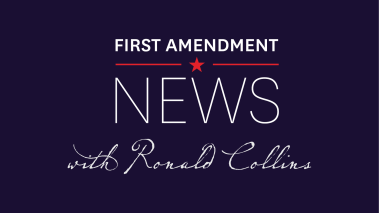
For so many of us in the law world, our spectrum of free expression is cabined in decisional law.
Important as that is, the frontiers of the First Amendment extend well beyond what judges say. There is also that realm in which such freedom is exercised — such as by writing books on different aspects of free expression. How we think about such freedom is (or should be) influenced by what writers write, what photographers photograph, what comedians say, and how “howl at the moon” poets express themselves.
By that measure, the geography of the free speech world reaches far beyond case reports.
If there is any doubt about public interest in the First Amendment, a spate of new and forthcoming books reveals that such interest is greatly expanding in all conceptual directions:
- Kliph Nesteroff, “Outrageous: A History of Showbiz and the Culture Wars” (Abrams Press, Forthcoming, Nov. 2024)

From the preeminent historian of comedy, an expansive history of show business and the battles over culture that have echoed through the decades and changed the United States.
There is a common belief that we live in unprecedented times, that nobody got offended in the past, that people are simply too sensitive today, that racism and sexism were once widely accepted without objection. The truth is precisely the opposite. With every step of our cultural history, minorities have pushed back against racist portrayals, women have fought for respect, and people have sought to change the world of entertainment and beyond through a combination of censorship, advocacy, or protest. Likewise, opposing forces have sought to sway public opinion and shape culture through violence and political and economic pressure.
Kliph Nesteroff, author of The Comedians and We Had a Little Real Estate Problem, presents a deep dive into the history of show business and illustrates both how our world has changed and how the fierce battlegrounds of today are reflected in our past. Outrageous is a crucial and timeless book filled with surprising details, remarkable anecdotes, and unforgettable characters, including figures we think we know, such as Mae West, Roscoe “Fatty” Arbuckle, and Stan Laurel (who tried to bury his wife alive but still wasn’t “cancelled”), and others readers may never have heard of.
- Michael Willrich, “American Anarchy: The Epic Struggle between Immigrant Radicals and the US Government at the Dawn of the Twentieth Century” (Basic Books, 2023)
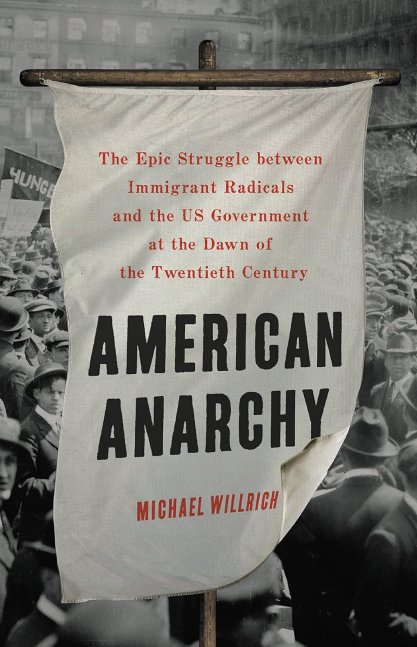
A “lively, fast-paced history” (Adam Hochschild, bestselling author of American Midnight) of America’s anarchist movement and the government’s tireless efforts to destroy it.
In the early twentieth century, anarchists like Emma Goldman and Alexander Berkman championed a radical vision of a world without states, laws, or private property. Militant and sometimes violent, anarchists were heroes to many working-class immigrants. But to many others, anarchism was a terrifyingly foreign ideology. Determined to crush it, government officials launched a decades-long “war on anarchy,” a brutal program of spying, censorship, and deportation that set the foundations of the modern surveillance state. The lawyers who came to the anarchists’ defense advanced groundbreaking arguments for free speech and due process, inspiring the emergence of the civil liberties movement.
American Anarchy tells the gripping tale of the anarchists, their allies, and their enemies, showing how their battles over freedom and power still shape our public life.
- Ralph Young, “American Patriots: A Short History of Dissent” (NYU Press, Jan. 2024)
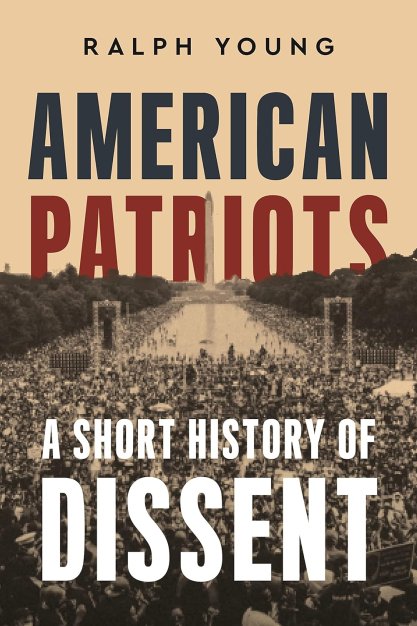
The history of America is a history of dissent. Protests against the British Parliament’s taxation policies led to the American Revolution and the creation of the United States. At the Constitutional Convention the founders put the right to protest in the First Amendment of the Bill of Rights. In the nineteenth century, dissenters protested against the War of 1812 and the Mexican War, they demanded the abolition of slavery, suffrage for women, and fair treatment for workers. In the twentieth century, millions of Americans participated in the Civil Rights Movement, the antiwar movement, and second-wave feminism. In the twenty-first century, hundreds of thousands protested the war in Iraq, joined the 2011 Occupy movement, the 2017 Women’s March, and the 2020 Black Lives Matter uprisings. The crowds grew larger than ever, but the sentiments expressed were familiar. There have been dissenting Americans for as long as there has been an America.
In American Patriots, historian Ralph Young chronicles the key role dissent has played in shaping the United States. He explains that activists are not protesting against America, but pushing the country to live up to its ideals. As he guides the reader through the history of protest, Young considers how ordinary Americans, from moderates to firebrands, responded to injustice. He highlights the work of organizations like SNCC and ACT UP, and he follows iconic individuals like Ida B. Wells-Barnett and Woody Guthrie, charting the impact of their dissent. Some of these protesters are celebrated heroes of American history, while others are ordinary people, frequently overlooked, whose stories show that change is often accomplished through grassroots activism.
- Nadine Strossen, “Free Speech: What Everyone Needs to Know” (Oxford University Press, 2023)
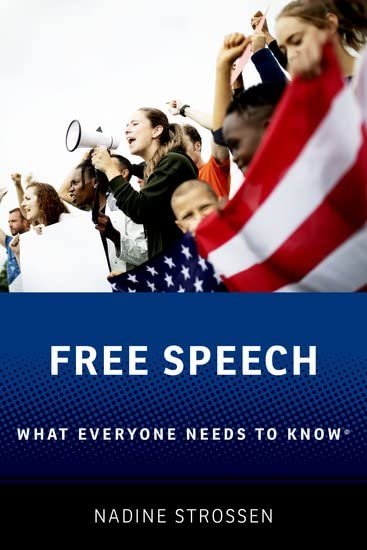
An engaging guide to the most important free speech rules, rationales, and debates, including the strongest arguments for and against protecting the most controversial speech, such as hate speech and disinformation.
This concise but comprehensive book engagingly lays out specific answers to myriad topical questions about free speech law, and also general explanations of how and why the law distinguishes between protected and punishable speech. Free Speech provides the essential background for understanding and contributing to our burgeoning debates about whether to protect speech with various kinds of controversial content, such as hate speech and disinformation: the applicable legal tenets and the strongest arguments for and against them.
The book focuses on modern First Amendment law, explaining the historic factors that propelled its evolution in a more speech-protective direction - in particular, the Civil Rights Movement. It highlights the many cases, involving multiple issues, in which robust speech-protective principles aided advocates of racial justice and other human rights causes. The book also shows how these holdings reflect universal, timeless values, which have been incorporated in many other legal systems, and have inspired countless thinkers and activists alike.
Without oversimplifying the complexities of free speech law, the book's lively question-and-answer format summarizes this law in an understandable, interesting, and memorable fashion. It addresses the issues in a logical sequence, presenting colorful facts and eloquent language from landmark Supreme Court opinions. It will be illuminating to a wide range of readers, from those who know nothing about free speech law, to those who have studied it but seek a well-organized summary of major doctrinal rules, as well as insights into their background, rationales, and interconnections.
- Christina Ellis, Renee Ellis, Edha Gupta, et al, “Fighting Censorship: A Handbook for Pushing Back on Book Bans” (Zest Books, Forthcoming, Nov. 2024)

Fighting Censorship: A Handbook for Pushing Back on Book Bans equips readers with arguments against the common reasons that are given to ban books in schools and public libraries.
In September 2021, the school board in York, Pennsylvania, voted to remove many books from school libraries in its community. The Panther Anti-Racist Union (PARU) at Central York High School, comprised of four students and two advisors, successfully fought the ban by organizing protests and media interviews to raise awareness.
In this book, the group takes on book banning and gives readers actionable advice for how to fight back against book bans, speak out against censorship in their communities, and win the right to intellectual freedom.
- Mickey Huff and Andy Lee Roth, eds, “Project Censored’s State of the Free Press 2025” (Seven Stories Press, Forthcoming, Dec. 2024)
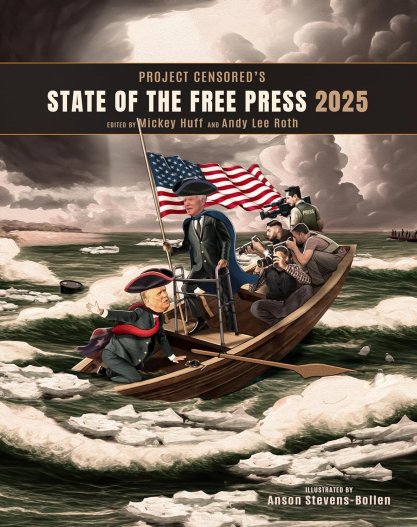
Highlighting the year’s most significant independent journalism—including reports on toxic chemicals, climate disinformation, and union victories—Project Censored’s State of the Free Press 2025 illuminates issues and raises voices that the establishment press have throttled.
State of the Free Press 2025 shows how independent journalism can promote civic engagement and reconnect people who have otherwise lost interest in sensational “news” that distracts and polarizes us.
Balancing critical analysis with optimistic vision, the book’s diverse contributors champion press freedom and critical media literacy to hold the powerful accountable and promote a more just and inclusive society.
State of the Free Press 2025 is a joint production of The Censored Press and Seven Stories Press.
To be sure, there are plenty more — all of which make the point far better than I can.
Trump sues ABC News and Stephanopoulos for defamation
- Oliver Darcy, “Trump sues ABC News and George Stephanopoulos for defamation over Nancy Mace interview,” CNN (March 19)
Former President Donald Trump filed yet another lawsuit against the news media late Monday, accusing ABC News and George Stephanopoulos of defamation over assertions the anchor made in a combative interview.
In an interview on “This Week,” Stephanopoulos pressed Republican Rep. Nancy Mace, a rape survivor, over her continued support of Trump after a jury found he sexually abused writer E. Jean Carroll in 1996, awarding her $88 million for battery and defamation. Stephanopoulos asserted multiple times in the interview with Mace that Trump had “raped” Carroll.
While a Manhattan federal jury last year found that Trump had sexually abused Carroll, sufficient to hold him liable for battery, the jury did not find that she proved he had raped her. Dismissing a countersuit months later, however, the judge in the case concluded that the claim Trump raped Carroll was “substantially true.”
“Indeed, the jury’s verdict in Carroll II establishes, as against Mr. Trump, the fact that Mr. Trump ‘raped her,’ albeit digitally rather than with his penis.
Justices seem sympathetic to Biden administration in social media case
- “Supreme Court Seems Favorable to Biden Administration in Landmark Social Media Case,” First Amendment Watch (March 18)
The Supreme Court seemed likely Monday to side with the Biden administration in a dispute with Republican-led states over how far the federal government can go to combat controversial social media posts on topics including COVID-19 and election security.
The justices seemed broadly skeptical during nearly two hours of arguments that a lawyer for Louisiana, Missouri and other parties presented accusing officials in the Democratic administration of leaning on the social media platforms to unconstitutionally squelch conservative points of view.
[ . . . ]
Several justices said they were concerned that common interactions between government officials and the platforms could be affected by a ruling for the states. In one example, Justice Amy Coney Barrett expressed surprise when Louisiana Solicitor General J. Benjamin Aguiñaga questioned whether the FBI could call Facebook and X (formerly Twitter) to encourage them to take down posts that maliciously released someone’s personal information without permission, the practice known as doxxing.
“Do you know how often the FBI makes those calls?” Barrett asked, suggesting they happen frequently.
Related
- Adam Liptak, “Supreme Court Wary of States’ Bid to Limit Federal Contact With Social Media Companies,” The New York Times (March 18)
Blacklisting groups: Justices appear receptive to NRA’s First Amendment arguments
- “Supreme Court Appears Receptive to NRA Free-Speech Lawsuit Against NY Official,” First Amendment Watch (March 18)
Supreme Court justices appeared receptive Monday to National Rifle Association claims that a former New York state official violated its free-speech rights by pressuring banks and insurance companies to blacklist the group after the deadly school shooting in Parkland, Florida.
The NRA is suing former New York State Department of Financial Services superintendent Maria Vullo, who the group says used her regulatory power to economically punish the group for its gun-rights stance in violation of the First Amendment.
The Biden administration has backed some of the NRA’s claims and encouraged the high court to reverse a lower court decision to toss out the suit. The NRA is being represented by a group often on the other end of the political spectrum: The American Civil Liberties Union.
“This is a First Amendment case. All they need to do is to show that the desire to suppress speech was a motivating factor,” said Justice Samuel Alito. Other justices in the court’s majority conservative wing also appeared receptive to the NRA’s suit.
Related
- Amy Howe, “Court sympathetic to NRA’s free speech claim,” SCOTUSblog (March 18)
Ken Paulson on public officials blocking social media critics
- Ken Paulson, “Can public officials block critics on social media posts? 4 takeaways from the Supreme Court’s decision,” The Free Speech Center (March 18)

The Court’s decision came in two cases: In O’Connor-Ratcliff v. Garnier, the issue was whether school board members violated the First Amendment in blocking parents from their board-related Twitter and Facebook accounts. In Lindke v. Freed, the issue was whether a city manager could block a constituent from his personal Facebook page.
Four takeaways from the Supreme Court’s ruling:
- New guidelines: The Supreme Court concluded that a public official violates the First Amendment if he “possessed actual authority to speak on the State’s behalf, and purported to exercise that authority when he spoke on social media,” according to the unanimous decision written by Justice Amy Coney Barrett. In other words, was the post actually government business and was this post part of the official’s job?
- Public officials have their own free-speech rights: The Court emphasized that government employees have a personal right to comment about matters involving their profession. Unless the post meets the requirements outlined by the Court, officials can freely block constituents’ comments.
- A sticking point in the Court’s decision: In assessing whether an official’s post is a government announcement and not a personal one, the Court suggested examining whether the information is available elsewhere. Clearly, the justices haven’t spent a lot of time in city halls. Municipal information is everywhere: in minutes of public meetings, in legal ads, on little-visited websites and in many more locations. That information is rarely visible, though, unless reported by journalists, issued in press releases or announced by public officials. This part of the Court’s test is not going to prove helpful.
- Keeping the personal and public separate: Smart public officials will have separate Facebook accounts for personal and professional purposes. The Supreme Court emphasized that deciding whether there’s a First Amendment violation may require a case-by-case, post-by-post examination. Public officials can save themselves – and the courts – time and trouble by maintaining separate accounts and keeping the content distinct.
New scholarly article on Generative AI: ‘the medium of disruption’
- Jon Garon, “The Revolution will Be Digitized: Generative AI, Synthetic Media, and the Medium of Disruption,” Ohio State Tech Law Journal (March 19)

OpenAI’s text generation program ChatGPT and the text-to-image generators Stable Diffusion and Dall-E have broken records for early public adoption, capital investment, and a technological shift potentially more far-reaching than even the internet itself. The broad category of generative AI has the potential to disrupt industry, art, and culture, both if done poorly and if done well. Despite significant problems with accuracy and deep concerns about the social and legal consequences of the premature adoption of these technologies, global multinational enterprises are moving these projects out of the test labs and into everyday use.
This article provides a comprehensive, but introductory overview of the development of generative AI, the training methods used to produce artificially generated content, the industry opportunities for generative AI, and the legal considerations that enterprises adopting these technologies should consider involving intellectual property. After discussing the development and implementation of the technology, the article emphasizes the key concerns regarding copyright, trademark, and trade secret. The article also identifies areas in which the growth of generative AI will require new federal legislation to retain the balance of creativity and commercial development within intellectual property laws.
More in the news
- Eugene Volokh, “Justice Jackson Seems to Be Charting a More Speech-Restriction-Tolerant Approach,” The Volokh Conspiracy (March 19)
- “Lawmaker pushing for TikTok bill shares why he does not view it as a ban,” CNN (March 19)
- Eugene Volokh, “The First Amendment, the Fourth Amendment, and Substantial Encouragement,” The Volokh Conspiracy (March 19)
- Will Rasenberger, “Does the First Amendment Protect AI Generated Speech?” The Regulatory Review (March 19)
- Eugene Volokh, “‘Black Lives Mat[t]er’ + ‘Any Life’ Drawing ‘Not Protected by the First Amendment’ in First Grade,” The Volokh Conspiracy (March 19)
- “From Reporter to Media Law Expert: Communications Professor Specializes in First Amendment Freedoms,” CSUF News (March 19)
- Lindsay Kornick and Alexa Moutevelis, “Justice Jackson ripped for worrying about the First Amendment 'hamstringing' government: ‘Literally the point,’” Fox News (March 19)
- Sopan Deb, “Supreme Court Lets Public Office Ban Stand for ‘Cowboys for Trump’ Founder,” The New York Times (March 18)
- “West Texas A&M President cancels student charity drag show for second time,” FIRE (March 18)
- Caitlin Vogus and Mary Ellen Roy, “Sen. Kennedy can protect Louisianans’ First Amendment rights by supporting PRESS Act,” USA Today (March 18)
- “Supreme Court Rejects Appeal by County Commissioner Banned for Jan. 6 Insurrection,” First Amendment Center (March 18)
- “Utah enacts FIRE’s model bill, protects due process rights on campus,” FIRE (March 18)
2022-2023 SCOTUS term: Free expression and related cases
Cases Decided
- McKesson v. Doe (Per Curiam: 7-1 with Thomas, J., dissenting: “[W]e conclude that the Fifth Circuit should not have ventured into so uncertain an area of tort law—one laden with value judgments and fraught with implications for First Amendment rights — without first seeking guidance on potentially controlling Louisiana law from the Louisiana Supreme Court. We express no opinion on the propriety of the Fifth Circuit certifying or resolving on its own any other issues of state law that the parties may raise on remand. We therefore grant the petition for writ of certiorari, vacate the judgment of the United States Court of Appeals for the Fifth Circuit, and remand the case to that court for further proceedings consistent with this opinion.”)
Review granted
- Vidal v. Elster (argued Nov. 1)
- O’Connor-Ratcliff v. Garnier (argued Oct. 31)
- Moody v. NetChoice, LLC & NetChoice, LLC v. Paxton (argued: Feb. 26)
- National Rifle Association of America v. Vullo (argument: March 18)
- Murthy v Missouri (argument: March 18)
- Speech First, Inc. v. Sands (certiorari granted, judgment re the bias policy claims vacated, and case remanded to the Court of Appeals for the 4th Circuit with instructions to dismiss those claims as moot) (Thomas and Alito, dissenting)
Pending petitions
- No on E, San Franciscans Opposing the Affordable Care Housing Production Act, et al. v. Chiu
- Mckesson v. Doe
- Pierre v. Attorney Grievance Commission of Maryland
- Brokamp v. James
- O’Handley v. Weber
State action
- Lindke v. Freed (Barrett, J., 9-0: “The state-action doctrine requires Lindke to show that Freed (1) had actual authority to speak on behalf of the State on a particular matter, and (2) purported to exercise that authority in the relevant posts. To the extent that this test differs from the one applied by the Sixth Circuit, we vacate its judgment and remand the case for further proceedings consistent with this opinion.”)
- O’Connor-Ratcliff v. Garnier (Per Curiam: 9-0: “We granted certiorari in this case and in Lindke v. Freed (2024), to resolve a Circuit split about how to identify state action in the context of public officials using social media. Because the approach that the Ninth Circuit applied is different from the one we have elaborated in Lindke, we vacate the judgment below and remand the case to the Ninth Circuit for further proceedings consistent with our opinion in that case.”)
Review denied
- Griffin v. HM Florida-ORL (application for stay denied)
- M. C. v. Indiana Department of Child Services
- Spectrum et al v. Wendler
- Porter v. Martinez
- Molina v. Book
- Porter v. Board of Trustees of North Carolina State University
- NetChoice, LLC v. Moody
- Alaska v. Alaska State Employees Association
- X Corp. v. Garland
- Tingley v. Ferguson (Justice Kavanaugh would grant the petition for a writ of certiorari. Justice Thomas, dissenting from the denial of certiorari. (separate opinion) Justice Alito, dissenting from the denial of certiorari. (separate opinion)
- Jarrett v. Service Employees International Union Local 503, et al
- Sharpe v. Winterville Police Dept.
- Winterville Police Department v. Sharpe
- Stein v. People for the Ethical Treatment of Animals, Inc., et al.
- Blankenship v. NBCUniversal, LLC
- Center for Medical Progress v. National Abortion Federation
- Frese v. Formella
- Mazo v. Way
Free speech related
- Miller v. United States (pending) (statutory interpretation of 18 U.S.C. § 1512(c) advocacy, lobbying and protest in connection with congressional proceedings) // See also Fischer v. United States (to be argued April 16)
Previous regularly scheduled FAN
FAN 415: “Moms for Liberty: The anti-liberty book banning group”
This article is part of First Amendment News, an editorially independent publication edited by Ronald K. L. Collins and hosted by FIRE as part of our mission to educate the public about First Amendment issues. The opinions expressed are those of the article’s author(s) and may not reflect the opinions of FIRE or Mr. Collins.
Recent Articles
FIRE’s award-winning Newsdesk covers the free speech news you need to stay informed.
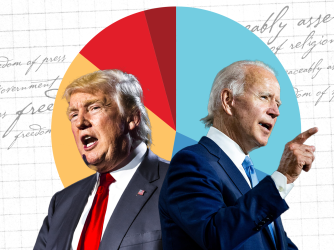
New FIRE poll: Americans equally skeptical Biden or Trump will protect First Amendment rights

Here’s what student journalists need to know about covering campus protests
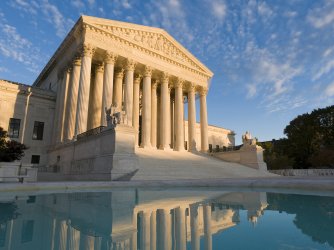
The 8 First Amendment cases the Supreme Court will decide this term


